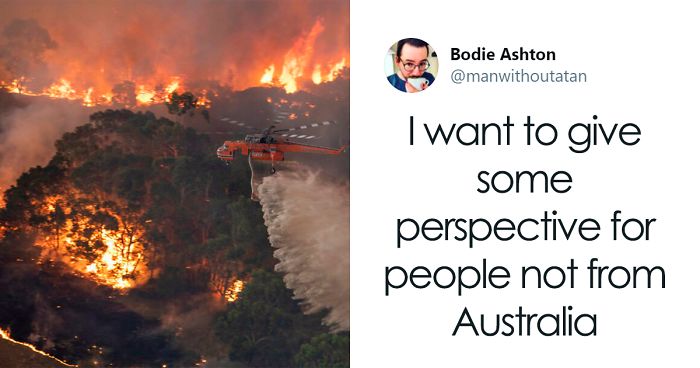
Guy Posts A Horrifying Tweet Thread That Reveals The Devastating Power Of The Australian Fires
The climate change issue has come to such a point that not only are people stepping up and shedding light on the matter, but nature itself has started to send obvious and rather dire signals.
It is sad to say that 2019 has been the year of wildfires. First, it was the Amazonian wildfires, claiming 2,240,000 acres of land. Then, the Californian wildfires (Kincade being the largest one), amounting to a total of 259,823 acres burnt. And, now, the ongoing New South Wales bushfires in Australia, with 8,895,794 acres of land destroyed and counting.
Australian bushfires in New South Wales have been raging since the beginning of September 2019
Image Credits: Beyond Coal & Gas
Writer and historian Bodie Ashton took to Twitter to shed some perspective on the wildfire situation in NSW, Australia. His spot-on comments and remarks have drawn the attention of thousands. In just two days, his tweet thread received over 133,000 likes and was retweeted over 72,000 times.
Ashton’s straightforward explanation of the situation has reached hundreds of thousands of people. The situation has gotten so out of hand that a country nearly 2,000 kilometers away—New Zealand—can feel it.
Historian Bodie Ashton came out with a tweet thread accurately explaining the situation
Image credits: manwithoutatan
Image credits: manwithoutatan
Image credits: manwithoutatan
According to Ashton, wildfires have spread so much that they are now as big as some European countries, e.g. Belgium
Image credits: manwithoutatan
Image credits: manwithoutatan
Image credits: manwithoutatan
Bored Panda got in touch with the author of the tweet, Bodie Ashton, to provide some comments and his thoughts on the issue. Dr. Bodie Ashton is a historian in Lower Bavaria, raised and educated in Adelaide, South Australia. He is also a researcher, author, lecturer, editor, and speaker who provides historical consultancy and lectures.
Wildfire containment and prevention seems to have always been problematic in Australia, as explains Ashton: “Bushfires have always been a concern in Australia because of the generally very dry and hot conditions in the summer. The fact that there are fires in summer is therefore an inevitability.”
“What is really concerning at the moment in Australia is the fact that the fires are so widespread.” continued Ashton. “They’ve formed so early in the fire season and are so intense. Ordinarily, state fire services can rely on firefighters from other states to assist.”
Bushfire smoke is causing breathing problems nation-wide—equal to smoking a packet of cigarettes a day
Image credits: manwithoutatan
Image credits: manwithoutatan
Image credits: manwithoutatan
Besides natural land, it is reported that over 1,300 houses were destroyed with 15 dead
Image credits: manwithoutatan
Image credits: manwithoutatan
Image credits: manwithoutatan
It is hard to predict when the fires will be doused as it has become somewhat of a self-reinforcing cycle: “In some places, the fires have formed the right meteorological conditions to create their own lightning storms,” elaborated Ashton. “Lightning will spread the fires if it strikes dry fuel, such as grassland, bark, and so on. With that, too, comes the risk of the wind, which not only changes the direction of the fire-front, but also can carry embers that will set fires kilometres away.”
Bored Panda asked Dr. Ashton to comment a bit on the political climate and possible aftermath of the bushfires. He had this to say: “I think that, if it’s difficult to predict how the fires will develop, it’s more difficult to predict the political situation. The Prime Minister, Scott Morrison, has made himself singularly unpopular within the electorate by seeming extremely out of touch—going on holiday to Hawaii was probably the least egregious of his most recent ‘missteps’.”
Dr. Ashton continued: “The problem is not necessarily Morrison in and of himself though; his party, the Liberal National Party, has assumed a very pro-coal and anti-climate science agenda, which has been singled out for comment by (among others) Greta Thunberg.”
Many Australians, including Bodie Ashton, are blaming Australia’s Prime Minister Scott Morrison
Image credits: manwithoutatan
Image credits: manwithoutatan
Here’s a bit of perspective of how far the smoke and ash has traveled from Australia
Image credits: manwithoutatan
“My position on climate change is quite clear—I think the vast weight of scientific evidence speaks for itself,” elaborated Ashton, “while the LNP government holds an ideological stance contrary to that, but to leave that disagreement aside for the moment: this government and its predecessors have been warned for years by scientists from the Commonwealth Science and Industrial Research Organisation (CSIRO) as well as by numerous other experts, that conditions in Australia are following a trend of becoming more conducive for earlier, larger, widespread, more intense, harder to control fires.”
“The fact that the government—whatever its ideological position on the climate change issue—is singularly unwilling even to entertain a discussion about it, ignores the counsel of its own experts, and instead relegates it to a purely “political issue”, is a clear failure of leadership from a body tasked with safeguarding the wellbeing of the Australian people,” explained Dr. Ashton his position.
Ashton continued: “I don’t like trying to predict the future, but if I were to gamble, I’d say that Morrison might well be finished as Prime Minister after this emergency passes, but in that case it will probably be dealt with internally by the LNP, understanding that he is now too unpopular with the Australian electorate to continue to function in the role. In that case, I fear that there will be some “window-dressing” and some shuffling of ministerial portfolios, but no significant change in who controls the levers of power.”
Ashton also expanded upon his comments with an update tweet
Image credits: manwithoutatan
Image credits: manwithoutatan
Image credits: manwithoutatan
Dr. Ashton concluded the interview with the following: “When I wrote my thread, it was not to claim any expertise—there are fantastic people doing work on this, but I’m not one of them. Instead, I’m a historian from Australia living in Germany, and I’ve come to realise that people couldn’t really visualise what these fires are like on the ground.”
“I want people, then, to understand three things in particular,” continued Ashton. “Firstly: I want them to think of Australia not as some far off place going through an emergency that affects only a small number of people. Instead, I want them to understand that this is a country where the fires in just one state, if you lined them up in a row, could stretch from London to Singapore.
“Secondly: I want them to know of the extraordinary bravery and heroism of Australian firefighters and volunteers. It is only due to them that more people have not been killed, in spite of the fact that they are woefully underfunded and ill-equipped, and many of them are faced with the possibility of extreme financial hardship because they can’t work or can’t fulfil their requirements for their unemployment payments.”
“Finally: I want people to understand that this is something that affects us all. It’s very easy to sit back and think that this is a terrible disaster we can’t do anything about. But we can. The fire services are accepting donations; there are volunteer organizations that have been thrown together so that people who are being evacuated can find somewhere to sleep with host families; even the act of sharing these things on social media might help to reach people who desperately need it.
Needless to say, something has to be done about it as the disaster reached a point where it affects us all
Image credits: Tatiana Gerus
Bored Panda also reached out to Clay Weston, a businessman and car enthusiast from Central Queensland, Australia, to comment on the wildfire issue from the perspective of a citizen living at the doorstep of a natural disaster.
“Central Queensland is relatively unaffected by the tragedy happening in New South Wales and Victoria,” explained Weston. “We have had wildfires in Central Queensland, but they were managed as best as the local emergency services could, volunteers assisted and were utilized to the best of their training and resources.”
A lot of people are blaming Australia’s Prime Minister Scott Morrison for wildfire mismanagement. Many criticize him for failing to make adequate preparations and precautionary measures (as there is a lack of equipment to deal with the fires) and for his economy-over-climate policies. To top it all off, people became enraged by the PM when he left for vacation to Hawaii, effectively leaving everyone else to deal with the fires.
The wildfires are so big that it can be seen from space
Image Credits: European Union, Modified Copernicus Sentinel Data
Weston also said that wildfire prevention and management in Australia has been hectic for a while: “The fact that the forestry has been mismanaged for 20 years can be laid at successive state governments of both political persuasions. No doubt in the aftermath there will still be differing opinions on why the fires are so big.”
As of the moment of this article, the wildfires are still ravaging New South Wales. Nearly 8.9 million acres of land have been burned to the ground, with over 1,300 reported homes lost to the fire and 15 deaths. Haunting red skies are ever-present, hitting pollution levels equivalent to smoking a packet of cigarettes a day.
“My friends from New South Wales tell me that there is up to 1 meter of debris/fuel on the forest floor…” pointed out Weston. “Once that much fuel starts to combust it’s almost impossible to stop in the rugged and inaccessible areas of those forests. The combustion is inevitable as the fires are making their own weather at this point.”
You can donate towards disaster relief and recovery efforts like the Red Cross and St Vincent de Paul Society to make a change and to help Australians affected by the bushfires.
926Kviews
Share on FacebookEverything I've heard/read about and all the pictures I saw of the fires in Australia and their consequences for the last few weeks or months are frightening and heartbreaking. I'm so grateful for all the firefighters, army, navy, doctors, vets, volunteers, etc. helping and taking care of properties, nature, animals and people. Without them things would be even worse. And RiP to all who lost their lives
hint hint; even five dollars can help>>>https://www.redcross.org.au/campaigns/disaster-relief-and-recovery-new-years-eve
Load More Replies...Australia's so-called leaders are totally out of touch with reality. So are climate-change deniers. Their heads must be pretty far up their arses!
If we only have 11.5 years left to live, then what does free healthcare, free tuition, and guaranteed jobs in the "Green new deal have to do with this so called climate change ? The worlds weather goes in many cycles through many years. The fires in Ca are from mismanagement of their forest, power lines right though the forest ( tree huggers would not let power line company clear out the path for the lines, so branches / trees fall on lines) Also many were set by arson
Load More Replies...If what you say is true this is an armageddon level crisis. The PM seems to be both ignoring the problem and taunting his own constituency. Talk about Nero fiddling while Rome burned.
Today on a visit to one of the affected areas he held out his hand to a firefighter who said no I don't want to shake your hand. So he then leaned forward and grabbed the guy's hand and shook it anyway. The firefighter got up and walked off (which shows a great deal of restraint because I'd have punched the a*****e if he did that to me, the guy said NO, you don't grab him anyway) He then went to an official and said please apologise to the firefighter but then went on to say 'he's probably just tired' which implies despite the apology he still thinks the firefighter was in the wrong and needs excusing. The official said 'No, he just lost his house'.
Load More Replies...Everything I've heard/read about and all the pictures I saw of the fires in Australia and their consequences for the last few weeks or months are frightening and heartbreaking. I'm so grateful for all the firefighters, army, navy, doctors, vets, volunteers, etc. helping and taking care of properties, nature, animals and people. Without them things would be even worse. And RiP to all who lost their lives
hint hint; even five dollars can help>>>https://www.redcross.org.au/campaigns/disaster-relief-and-recovery-new-years-eve
Load More Replies...Australia's so-called leaders are totally out of touch with reality. So are climate-change deniers. Their heads must be pretty far up their arses!
If we only have 11.5 years left to live, then what does free healthcare, free tuition, and guaranteed jobs in the "Green new deal have to do with this so called climate change ? The worlds weather goes in many cycles through many years. The fires in Ca are from mismanagement of their forest, power lines right though the forest ( tree huggers would not let power line company clear out the path for the lines, so branches / trees fall on lines) Also many were set by arson
Load More Replies...If what you say is true this is an armageddon level crisis. The PM seems to be both ignoring the problem and taunting his own constituency. Talk about Nero fiddling while Rome burned.
Today on a visit to one of the affected areas he held out his hand to a firefighter who said no I don't want to shake your hand. So he then leaned forward and grabbed the guy's hand and shook it anyway. The firefighter got up and walked off (which shows a great deal of restraint because I'd have punched the a*****e if he did that to me, the guy said NO, you don't grab him anyway) He then went to an official and said please apologise to the firefighter but then went on to say 'he's probably just tired' which implies despite the apology he still thinks the firefighter was in the wrong and needs excusing. The official said 'No, he just lost his house'.
Load More Replies...
 Dark Mode
Dark Mode 

 No fees, cancel anytime
No fees, cancel anytime 


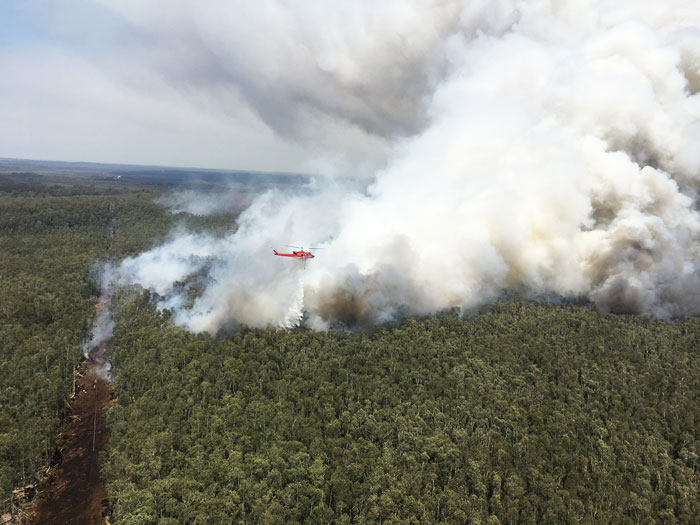
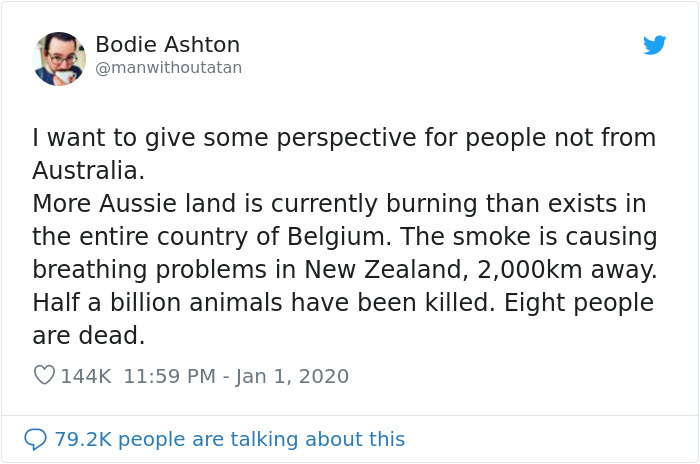
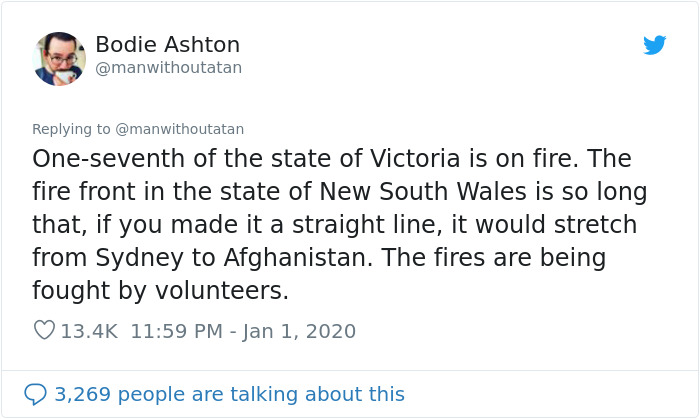
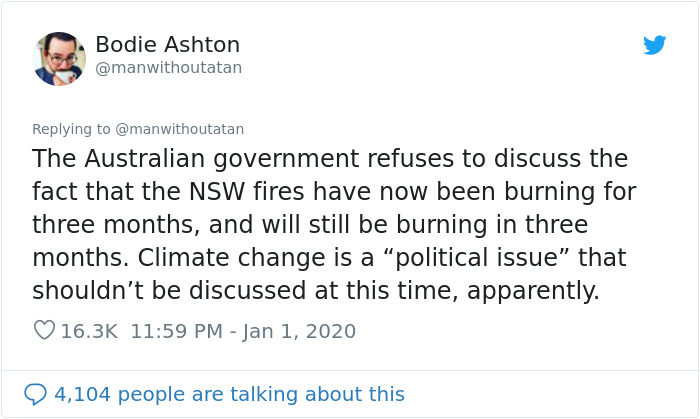
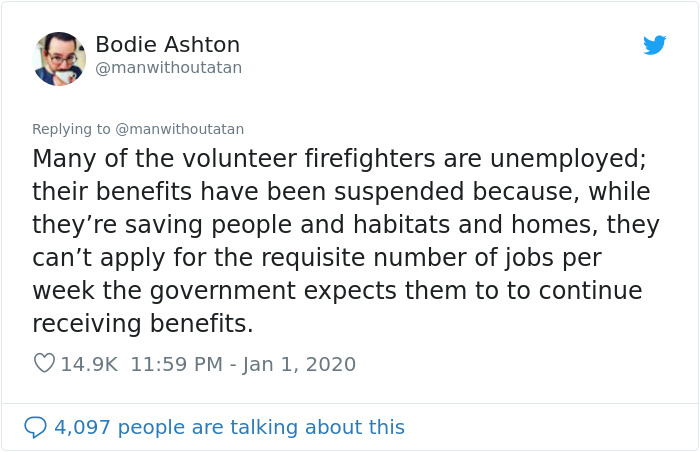

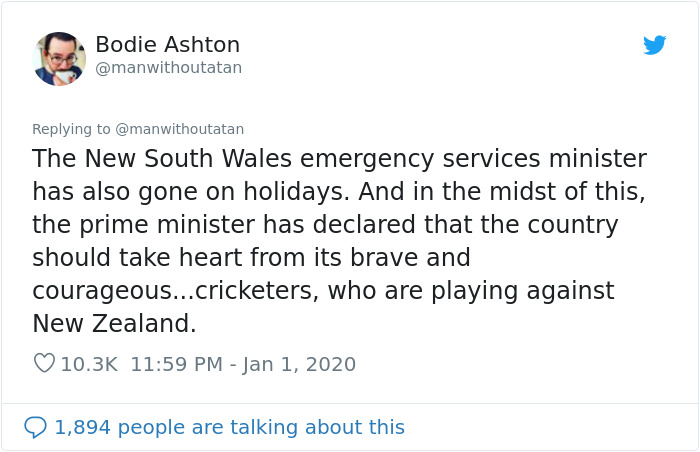
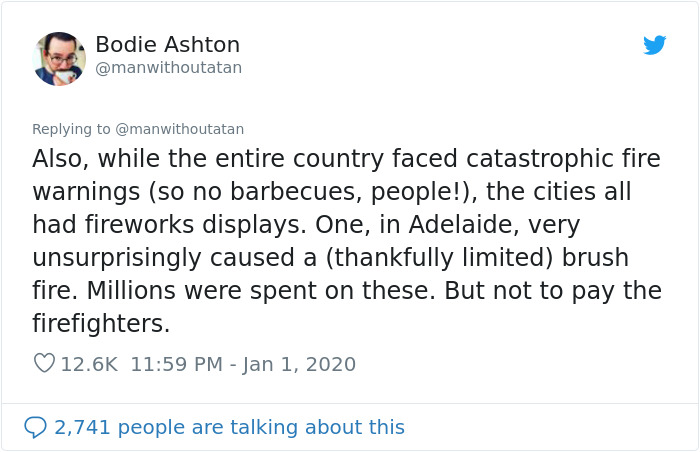
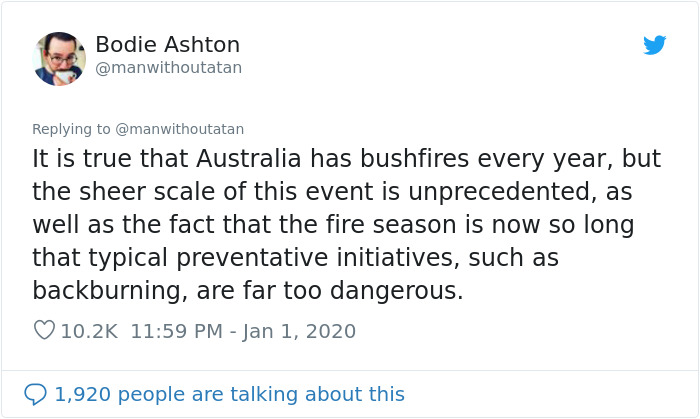
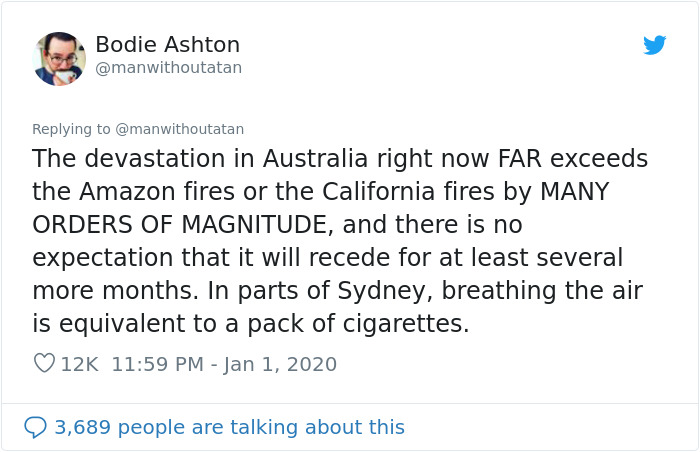
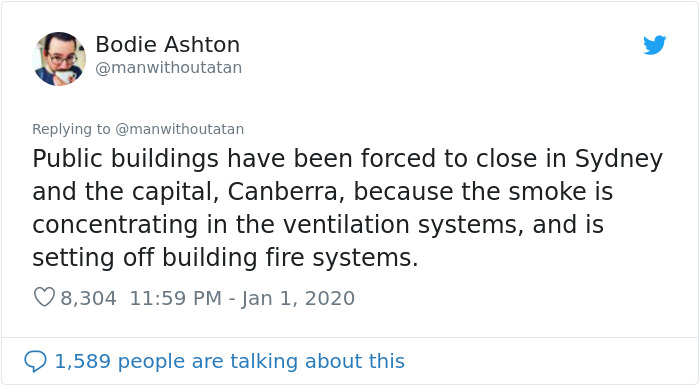
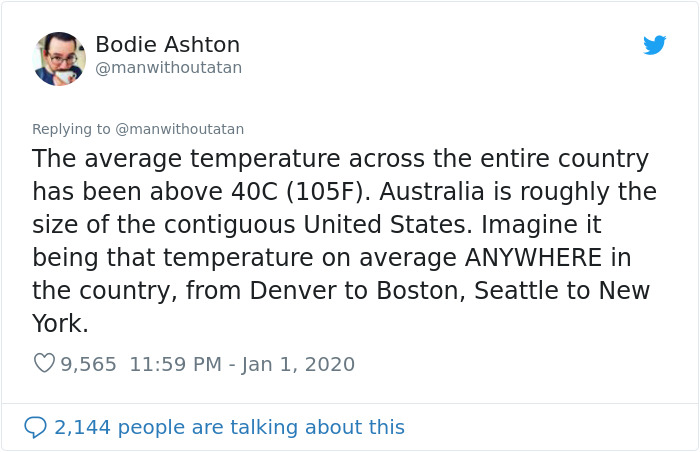
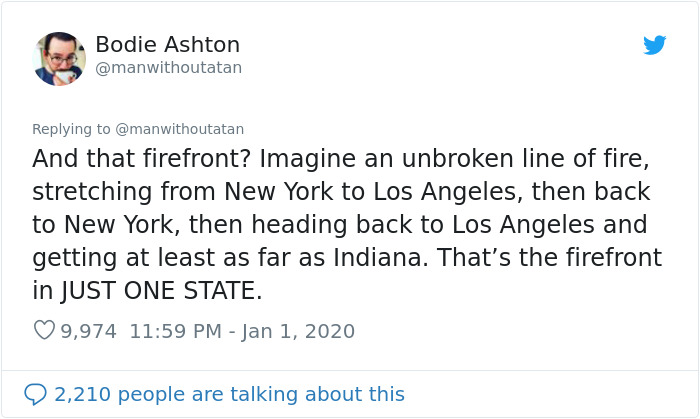
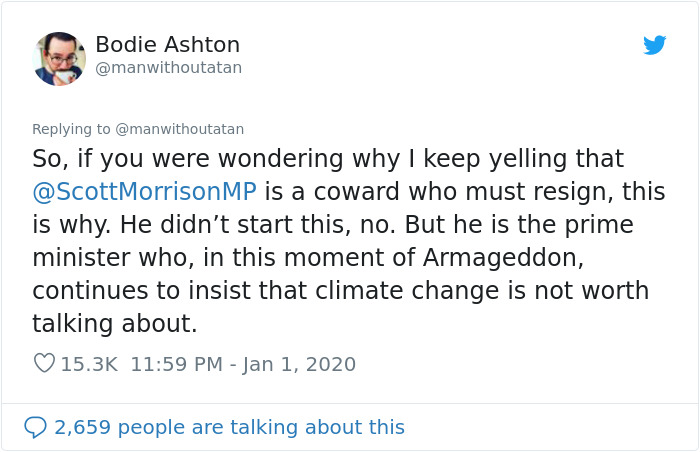
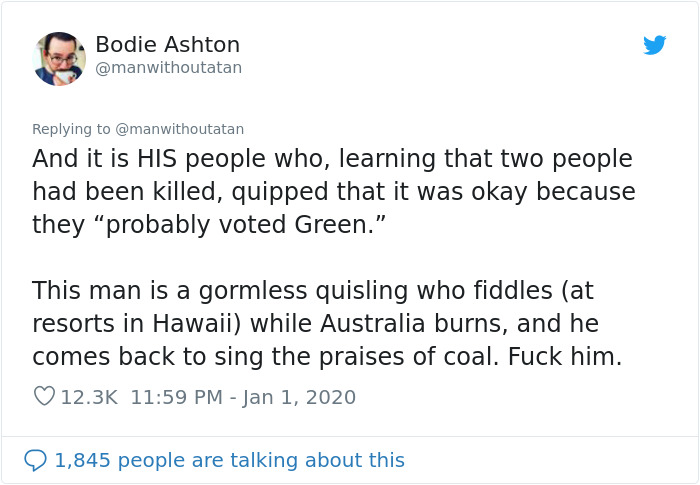
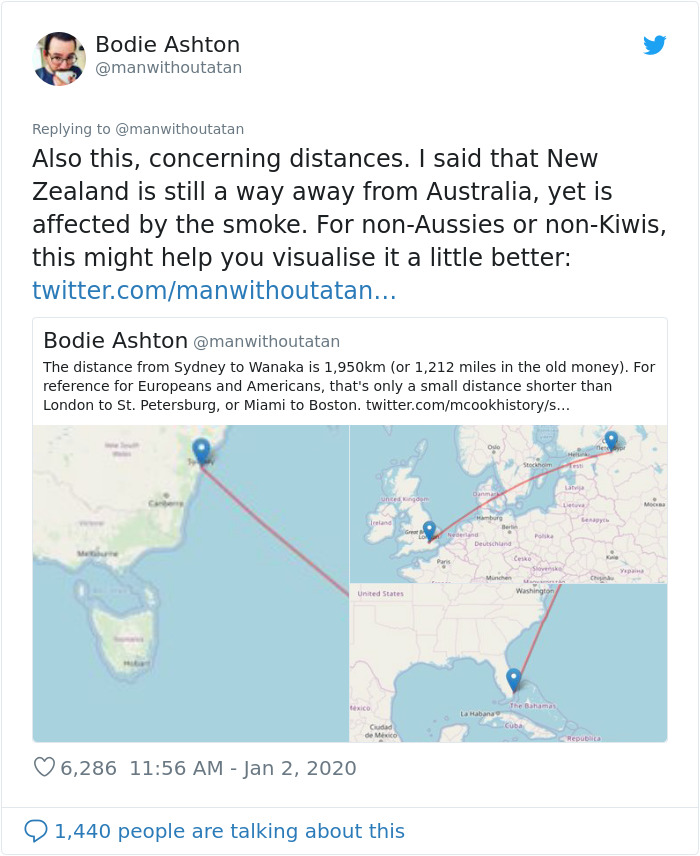
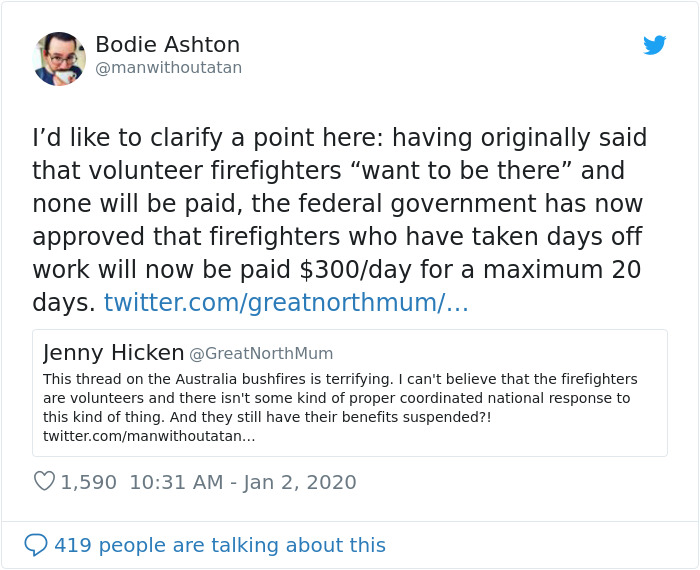
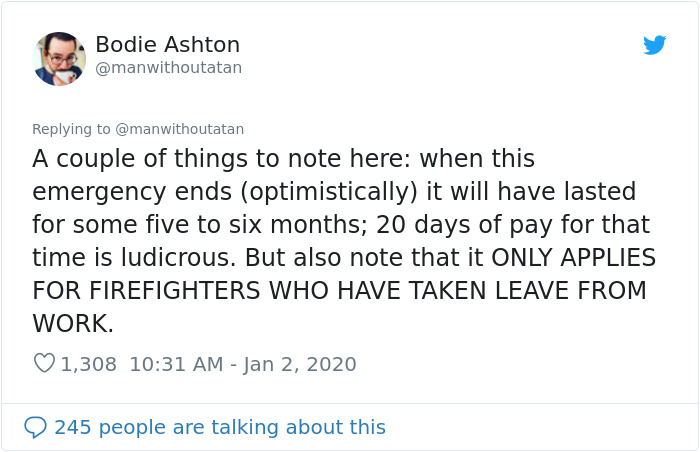
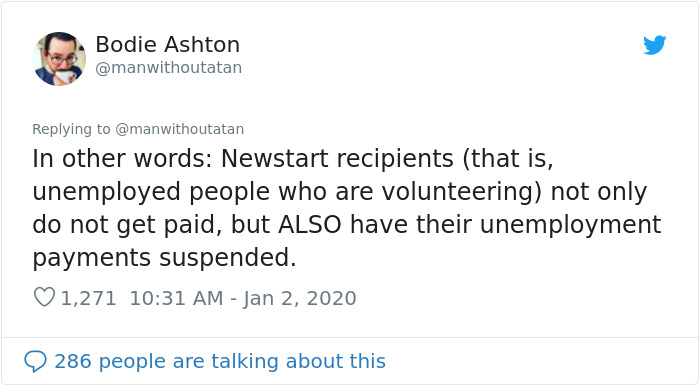
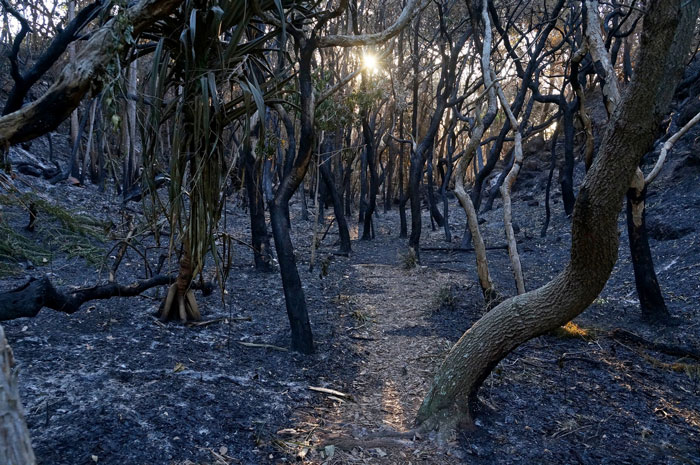
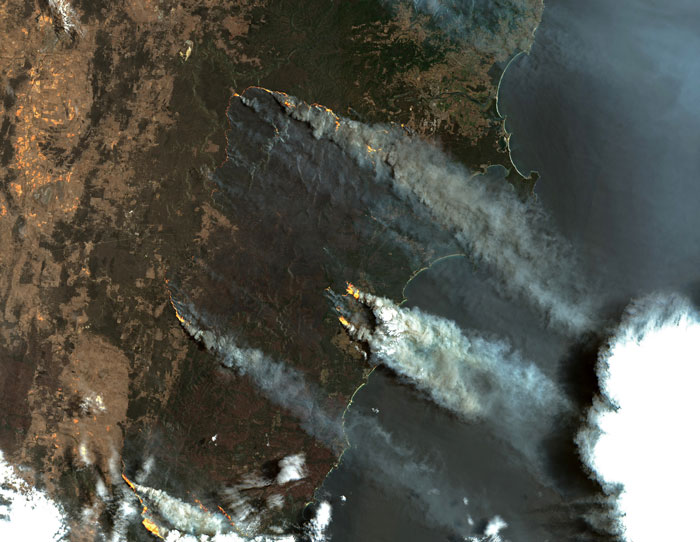











































188
118